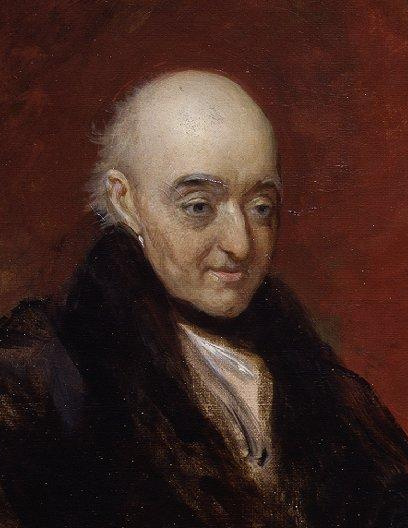Nige discovers a once-famous and now nearly-forgotten poet while sitting on a park bench…
I’ve written before about the pleasure of sitting in the dry in Holland Park and looking out at the rain. Not long ago I was doing just that, from a comfortable bench in a south-facing alcove, enjoying the lusty singing of the blackbirds and robins all around. Over this bench is an elegantly lettered plaque bearing the couplet:
‘Here Rogers sat, and here for ever dwell
With me those pleasures that he sings so well.’
Rogers? The only literary Rogers I know is the all but forgotten 19th-century poet Samuel Rogers – and surely that couplet sounds Augustan? But no, a little online research revealed that the lines were indeed written by Lord Holland to commemorate his friend Samuel Rogers, the poet and conversationist who, it turns out, was a popular member of the Holland House set.
Rogers was one of those figures who loom very large in their time, less for what they have written but for their conversation – Rogers’ was sharp, fluent and witty, by all accounts – and their prodigious abilities as mixers. He moved in the highest circles, both literary and social – the kind of man who knew everybody and was invited everywhere.
Like T.S. Eliot (though in no other respect), he began as a banker before turning full time to the literary life. His greatest success was Italy: A Poem, a travelogue in verse which initially flopped, but which he cannily reissued with fine illustrations by Turner, Stothard and others – suddenly it was the book everyone had to have, if only on their coffee table. De luxe editions still fetch thousands of pounds in the antiquarian book market – for the binding and the pictures; nobody is interested in Rogers’ all too perishable lines.
Despite (or because of?) his limited gifts, he was, towards the end of his long life, offered the Laureateship – but, to his credit, turned it down in favour of Tennyson. Oddly, one line of his survives and thrives: it seems he originated ‘To know her was to love her‘. Thus something of Rogers lives on in countless funeral eulogies – and, with a slight adjustment of tense, in a Beatles song. And I have sat where Rogers sat…












Rogers expression cries out “tomorrow I shall be forgotten”. Change gender and you have this little number, in it’s day it had strange aphrodisiac qualities. As Holland Park seems to have had, way back when.
Thanks Malty – the Teddy Bears indeed! I had forgotten them…
To us, Rogers seems notable only for his longevity: he started out in the age of Gray and Goldsmith (who remained his only masters), passed more or less untouched through the era of High Romanticism, and was still an unbudgeable fixture on the literary scene when Dickens was at the height of his fame.
Although barely remembered now, Rogers must have been a striking and rather unsettling person to have met. He was known for his extremely cadaverous appearance, which led him to wear several layers of extra clothing and earned one friend to nickname him ‘Mr von Dug Up’. By his own account, he developed his habit of ferocious sarcasm as compensation for a very feeble piping voice.
In one of his letters Dickens describes a boozy dinner at which, to everyone’s great surprise, the distinguished poet suddenly fell down dead drunk. Afterwards,
I helped Rogers on with his over-shoes for his usual night-walk home. “Do you know how many waistcoats I wear?” asked the poet of me, as I was doing him this service. I professed my inability to guess. “Five!” he said: “and here they are!” Upon which he opened them, in the manner of the gravedigger in Hamlet, and showed me every one.
The uncanny, rather Beckettian figure of Grandfather Smallweed in Bleak House — “a bundle of clothes with a voice in it” — is said to have been based on Rogers in his last years.
Thanks, Jonathan – what an extraordinary fellow! Makes you wonder how he got to be such a social/literary lion, doesn’t it? One of those magnetic personalities perhaps…
Patrick Kurp writes about Samuel “Breakfast” Rogers here:
“He would have received you with all kindness”
http://evidenceanecdotal.blogspot.com/2011/09/he-would-have-received-you-with-all.html
Thanks, Dave.